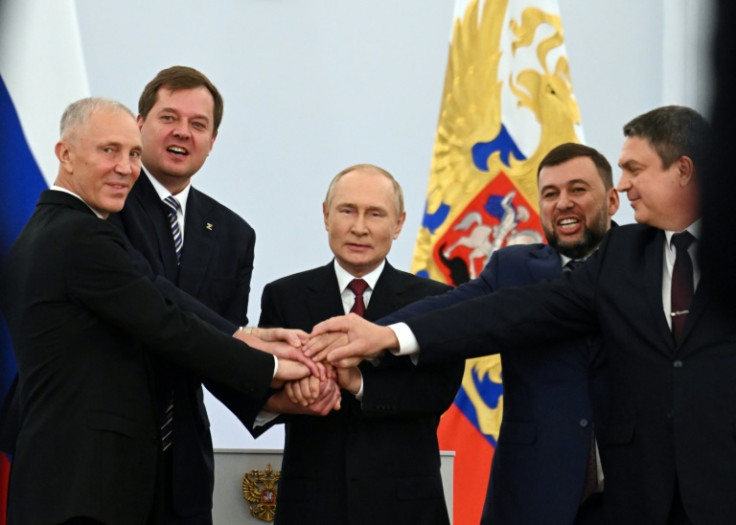Russia Escalates Nuke Threat, Says Annexed Ukrainian Regions Fall Under Nuclear Protection
KEY POINTS
- President Vladimir Putin had last month issued a veiled nuclear threat
- Ukrainian troops have been successful in pushing Russian forces back in annexed regions
- Moscow has blamed the West for pushing Kyiv to shift the military action into Russian territory
- With martial law in place in the four annexed regions, Russia has said the territorial defense will be streamlined
Escalating the threat of nuclear confrontation, the Kremlin has said the four regions it annexed from Ukraine fall under Russia's nuclear protection.
"All those territories are an inseparable part of Russia, and therefore all of them are under [our] protection," the Kremlin spokesperson Dmitry Peskov said Tuesday when asked whether the regions fall under the country's nuclear umbrella, Russian news agency TASS reported.
"Their security is guaranteed precisely at the same level as the rest of the country," Peskov said.
Blaming the West for pushing Kyiv to shift the military action into Russian territory, President Vladimir Putin had last month issued a veiled nuclear threat, while announcing his decision on mobilization.
Claiming the West "talk about how all available means should be used to destroy Russia," Putin had said: "Those who allow themselves such statements on Russia, I'd like to remind you that our country has various [weapons] of destruction, more advanced than NATO countries."
"When the territorial integrity of our country is threatened, we will certainly use all the means at our disposal to protect Russia and our people. This is not a bluff," the Russian president had warned.
Increasing fears of a nuclear confrontation come after Ukrainian troops, in a major counteroffensive launched last month, attacked and pushed back Russian troops in the south and east, reclaiming large parts of the territory occupied and annexed by Russia.
Russian military doctrine says the country reserves the "right to use nuclear weapons in response to the use of nuclear and other types of weapons of mass destruction against it" as well as "in the event of aggression against" the country, even with the "use of conventional weapons when the very existence of the state is in jeopardy."
Comments by the Kremlin on Tuesday were followed by the declaration of martial law by Putin, which will come into force Thursday in the annexed Ukrainian regions of Donetsk, Lugansk, Zaporizhzhia and Kherson.
According to the news agency TASS, once the martial law is in place, inter-agency coordination headquarters will be created in the Zaporizhzhia and Kherson regions to streamline territorial defense — a complex of measures to protect military, administrative and civilian facilities — similar to the ones in structures are already functioning in the Donetsk and Lugansk.
Ukraine's military chief General Valeriy Zaluzhnyi had early last month raised the nuclear alarm, saying there was "direct threat" that Russia under certain circumstances could use "tactical nuclear weapons."
"It is also impossible to completely rule out the possibility of the direct involvement of the world's leading countries in a 'limited' nuclear conflict, in which the prospect of World War Three is already directly visible," General Zaluzhnyi said in a co-authored article published by Ukrainian state news agency Ukrinform.
The U.S. president, Joe Biden, had earlier this month warned of the "prospect of Armageddon," if Russia were to use nuclear weapons. Meanwhile, Washington has repeatedly said it takes Russia's threats of nuclear war seriously, although it does not see indications of a present threat.
Facing a severe shortage of weapons, the fear is Putin will sooner or later be forced to dip into Russia's tactical nuclear arsenal to achieve victory or at least freeze the conflict.
Following his invasion of Ukraine on Feb. 24, the Russian president gave orders to increase the alert level of his country's nuclear forces as a deterrence against NATO involvement in the war.

© Copyright IBTimes 2025. All rights reserved.






















